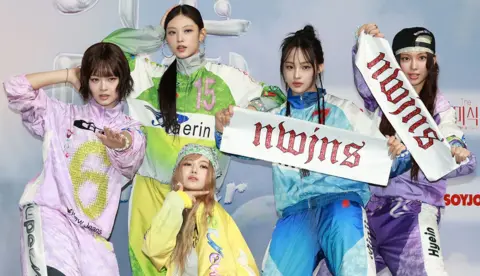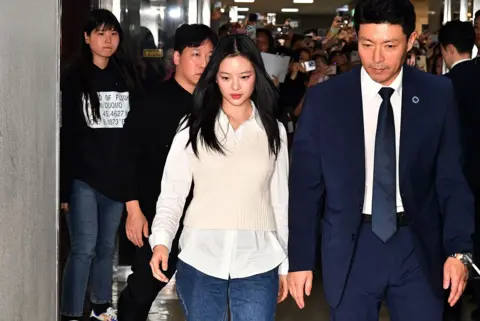 Getty Images
Getty ImagesThey’ve sold more albums than any other K-pop girl band last year, have tens of millions of fans worldwide and are arguably one of South Korea’s hottest acts.
What the members of NewJeans aren’t however, are workers, according to the government.
The country’s Ministry of Employment and Labor on Wednesday dismissed claims of workplace harrassment against a member of the group, saying celebrities were not seen as workers under the country’s labour law – and were therefore not entitled to the same rights.
The decision has drawn its fair share of scorn – and unsurprise – with some saying it is just the latest to come from an industry known for its punishing schedules and intense competition.
This is the latest scandal to hit NewJeans, which has for months been embroiled in a public feud with its record label, Ador.
With slick pop songs like Super Shy, OMG and Supernatural, NewJeans were the eighth biggest-selling act in the world last year, and were nominated for best group at this year’s MTV Awards.
Formed by label Ador in 2022, the group has five members – Minji, Hanni, Danielle, Haerin and Hyein – whose ages range from 16 to 20.
The incident started after 20-year-old Hanni and the other four members of the band raised concerns about their treatment by Ador during an impromptu YouTube livestream on 11 September.
In the band’s YouTube video, which has since been deleted, they made claims of workplace harassment, among others, which culminated in Hanni saying she would testify in a hearing about bullying in the music industry.
The Vietnamese-Australian singer, whose real name is Pham Ngoc Han, told lawmakers that she felt “the company hated us”.
She described how senior members of Hybe ignored her and her bandmates, and gave them cold shoulder. She also alleged that employees of the agency bad-mouthed NewJeans on internal communication app and asked a journalist to downplay the group’s record sales in one article.
Hybe had previously denied the accusations. The CEO of Ador, which is a subsidiary of Hybe, said at the hearing that she would “listen more closely” to her artists.
Her allegations prompted fans to file a petition about workplace bullying to the government.
 Getty Images
Getty ImagesBut on Wednesday, South Korea’s labour ministry rejected these claims, saying given the content and nature of the management contract signed by Hanni, she is not regarded as a worker under the country’s Labour Standards Act.
“Individuals must meet the criteria under the Labour Standards Act… to be considered workers. This includes having fixed working hours and providing labour under the employer’s direct supervision and control. Celebrities, including singers, are typically classified as independent contractors,” Chunghwan Choi, senior partner of Yulchon law firm in Seoul explained.
The government also cites the nature of Hanni’s income, which is deemed to be “profit sharing, rather than wages”, according to local reports, adding that she pays business income tax rather than employment income tax.
One expert has called the response “utterly unfair and yet unsurprising”.
The work for K-pop idols is “emotionally and physically exhausting”, according to her, as they work “incredibly long hours, often seven days a week for months in a row…[with] no clearly defined periods of rest”, says CedarBough Saeji, Assistant Professor of Korean and East Asian Studies at Pusan National University in South Korea.
“Exploitation of the workers is accepted because they are not regular employees and there is no labour union, or clearly we can now see, no governmental agency to advocate for humane working conditions for them,” she argues.
There are currently no specific laws in South Korea that provide protections for the working rights of celebrities or artists, says Mr Choi, saying that this “underscores the urgent need for reforms to address longstanding issues in the entertainment industry”.
One measure that could be put into place to safeguard the working rights of artists is something similar to the Talent Agency Act in Hollywood, which requires talent agencies to obtain licenses and prohibits unfair or exploitative contracts, adds Mr Choi.
However, he adds that “while there have been discussions about implementing laws similar to the Talent Agency Act, no such legislation has been enacted yet”.
‘Idols are Workers’
On Wednesday, New Jeans fans rallied under the hashtag “IdolsAreWorkers” in support of the band.
Others pointed out that the decision had a legal basis, as celebrities were not technically seen as workers under the law, but called for greater reforms in the industry.
“I get what they’re saying about the role not qualifying for the legal defintion of workplace harrassment, but this just shows the need for reform in the K-pop industry”, said one user on X.
Hanni has yet to comment on the government’s decision.
Hybe, which represents massive K-pop groups such as BTS and Seventeen, is South Korea’s largest music firm.
South Korea’s entertainment industry is known for its high-pressure environment, where celebrities are held to strict standards over their appearances and behaviour.

